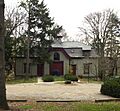Adams-Nervine Asylum facts for kids
Quick facts for kids Adams-Nervine Asylum |
|
|---|---|
| Geography | |
| Location | Jamaica Plain, Boston, Massachusetts, United States |
| Coordinates | 42°18′13″N 71°7′31″W / 42.30361°N 71.12528°W |
| History | |
| Closed | 1976 |
The Adams-Nervine Asylum was a special place that opened in 1880 in Jamaica Plain, Massachusetts. It was created to help people who were struggling with nervous conditions. The asylum was located in a beautiful area near Bussey Park and the Arnold Arboretum.
A man named Seth Adams bought the land for the asylum. He had made his money from a sugar refinery. When he passed away, he left $600,000 to start a place that would help people with nervous problems. These were people who lived in Massachusetts and needed help but were not considered "insane." The asylum closed its doors in 1976.
Contents
A Special Way to Help People
The Adams-Nervine Asylum followed ideas from a doctor named Thomas Kirkbride. He was a psychiatrist from Philadelphia who believed in a "moral treatment" approach. This meant treating patients with kindness and respect.
Kirkbride thought that people with nervous conditions should live in a home-like setting. He believed they should not be isolated. The asylum focused on treating each patient as an individual. It also allowed them freedom to move around.
Who Stayed at the Asylum?
The first patient came to the asylum on April 11, 1880. Most of the people who stayed there were unmarried women. Doctors thought their nervous problems often came from working too hard and taking care of others.
Many women who did housework or taught suffered from nervous conditions. About 20 percent of patients were housewives. For them, too much work, worry, and not enough sleep were often the causes.
One famous patient was Alice James. She was the sister of the famous writer Henry James and psychologist William James. Alice stayed at the Adams-Nervine during the summer of 1883.
How Much Did Patients Improve?
Not many patients fully recovered at the asylum. One doctor, Dr. Webber, explained why. He said many patients had been sick for years or had inherited a weak nervous system. If they also had limited money, they had to keep working hard.
This strain made it hard to fully recover in just a few months. However, the stay still helped a lot. Patients gained new strength and courage. They could then go back to their lives feeling better. Many even continued to improve after leaving.
Patients usually stayed for a little over four months. Few stayed longer than six months. Staying for a whole year was not common.
The Buildings of the Asylum
The Adams-Nervine Asylum had several buildings. The oldest one, the J. Gardiner Weld House, was built around 1875. It had a fancy French Mansard style. This building later became the asylum's main offices.
The Adams House was built in 1880. This building was for the female patients. A separate house for men was finished in 1895. However, men made up only about 25% of the patients.
The Director's House looked different. It had a Colonial Revival style with a balanced and classic design. This was different from the more decorative Weld Mansion and Adams House.
The asylum was named a Boston Landmark in 1977. It was also added to the National Register of Historic Places in 1982. Today, the old asylum buildings have been turned into condominiums and apartments.
Images for kids
See also




